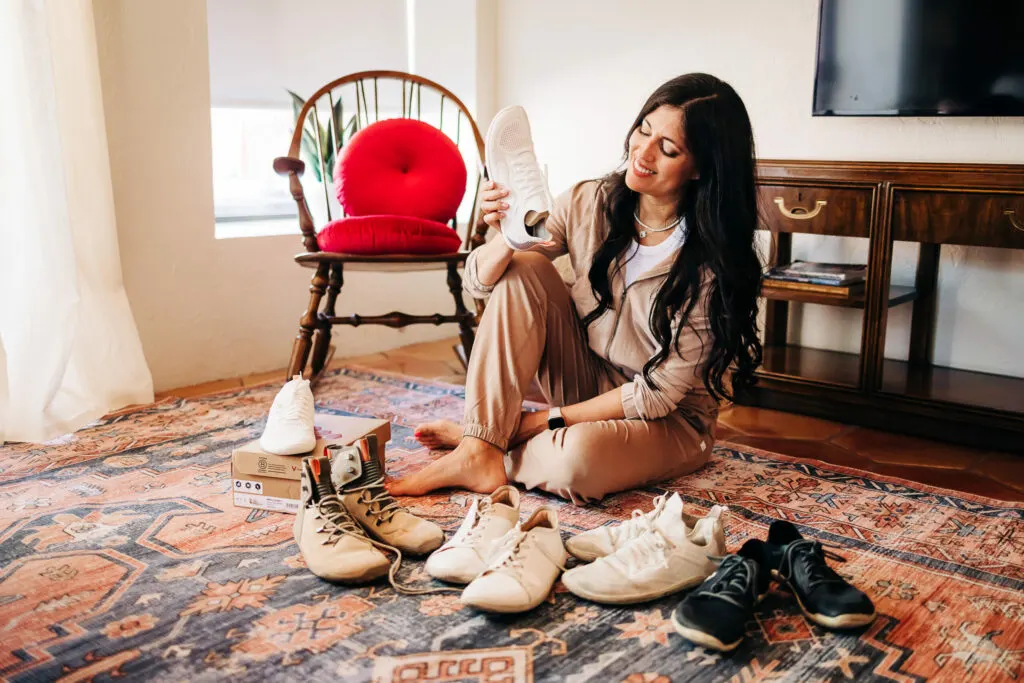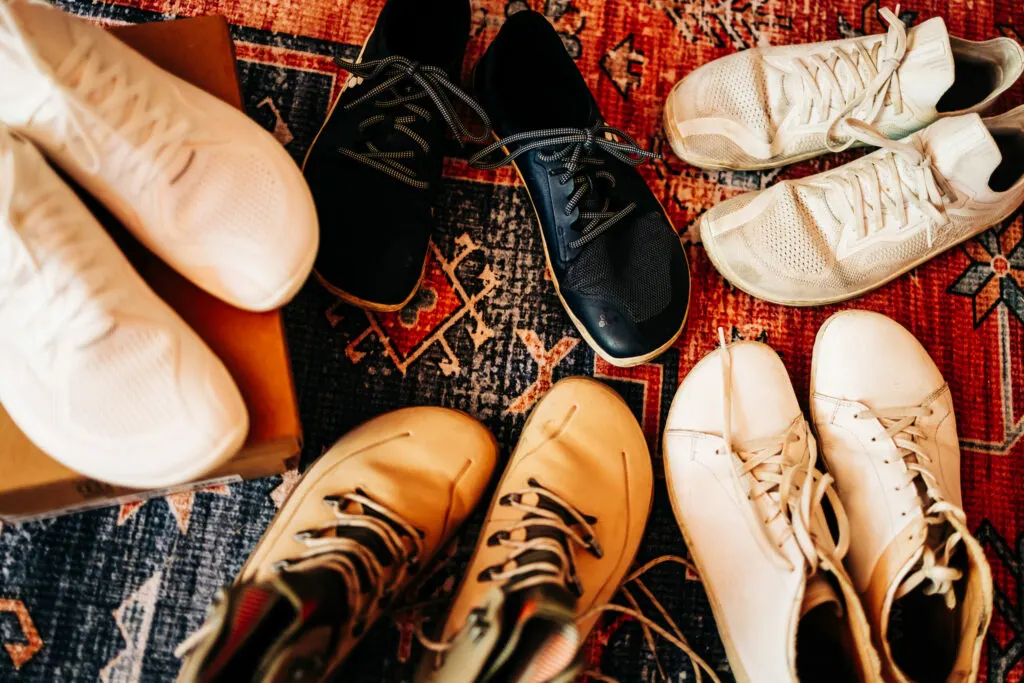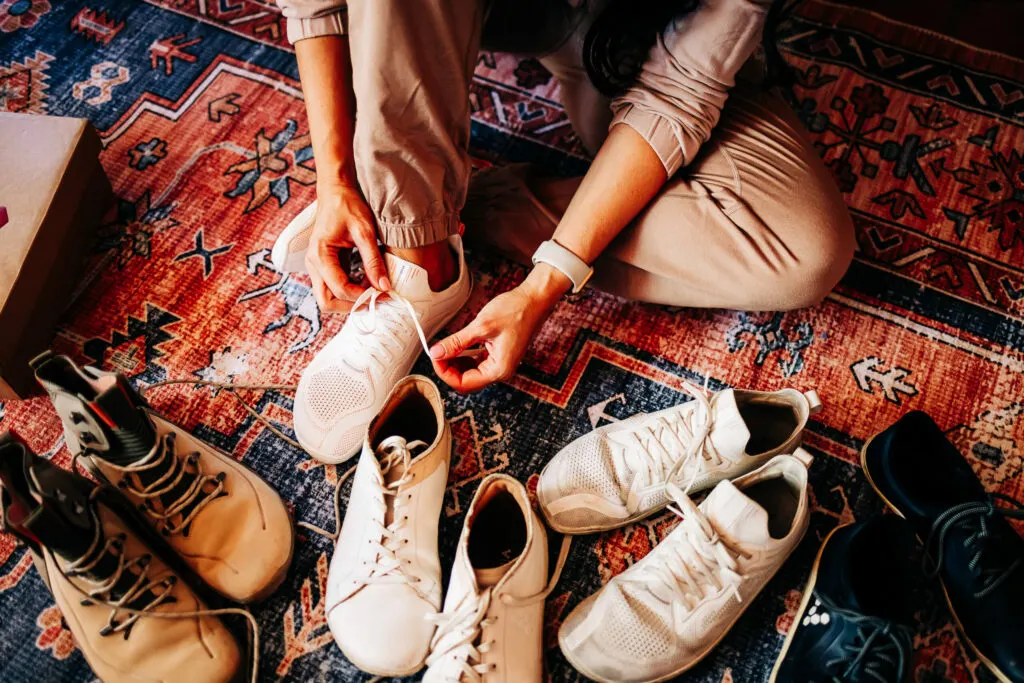Sharing why I’m obsessed with barefoot shoes and how you can incorporate them into your fitness routine and life!
Hi friends! Happy Monday! How was the weekend? I had an amazing time in San Diego with Betsy attending the Lagree certification workshop at DEFINE. (San Diego friends, go take a class with my friend Carina! I’ve known her for years – we taught barre together in SD – and she’s an incredible instructor and person.)
So today, let’s talk about barefoot shoes.
(It was hilarious when I went to gather all of my shoes for this photoshoot. I was like wow I really do have five pairs and I use and love all of them!)
Barefoot shoes have been around for quite a while.
According to this website:
In the 20th century, barefoot shoes emerged as people began questioning the need for heavily cushioned and supportive shoes. In the 1960s and 1970s, the popularity of the “Jogging” movement led to the development of more minimalist running shoes, which aimed to mimic the barefoot experience.
I think many of us can remember the early 2000s, when barefoot shoes saw a resurgance as Vibrams came out. I remember seeing them for the first time — they looked like duck feet to me. They were horrendous lol. But, it was definitely a lightbulb moment. I’ve worked in the fitness industry since 2008, and after multiple trainings and workshops (like the foot stretching and gait classes I took and then taught at Canyon Ranch), I realized the impact of footwear on overall function and how minimalist shoes can change your workouts and life.
Barefoot shoes are not only lightweight and super comfortable, but they enable us to have full function of our foot muscles, full toe splay (instead of our toes being crammed into narrow shoes), and can affect overall posture, alignement, and performance.
why you should switch to barefoot shoes
What Are Barefoot Shoes?
Barefoot shoes are designed to naturally mimic our bare feet, with the extra protection and public consideration of having soles. I don’t think many of us would want to walk down a grimy street or work out in an gym without actual shoes. They have a minimalist design, low heel drop (so they don’t have the high back cushion many running shoes include), thin soles, and wide toe boxes so our toes can breathe and move freely.
The key differences between barefoot shoes and traditional footwear are the heel drop and toe boxes. My barefoot shoes look so wide compared to my *normal* shoes and sneakers.
Benefits of Wearing Barefoot Shoes
1. Natural Foot Alignment
Think about the position of your feet and how it affects natural posture and foot alignment. Some shoes may cause us to lean forward to keep our balance, shift the pelvis out of alignment, and also affect our gait. It’s unfortunate because the look cute, but heels are some of the worst shoes we can wear for pelvic floor health, posture, and overall function (especially knees, hips, and ankles0>
Barefoot shoes also reduce the likelihood of bunions, hammertoes, and other foot deformities because your toes aren’t being smushed!
2. Strengthens Foot Muscles
Barefoot shoes encourage muscle engagement in the feet, ankles, and calves. The thin sole allows you to *grip* the floor more effectively, which can cause you to activate MORE muscles as you live and work out.
The thin soles lead to stronger arches and better stability because you have to work to stabilize your foot; without the extra cushion, more muscles are able to activate.
3. Improved Balance and Stability
In barefoot shoes, you’re able to sense the ground more effectively, improving proprioception, which is the recognition of where our bodies are in space. Proprioception training is huge in preventing falls, especialy as we age.
4. Better Posture
Barefoot shoes enourage a natural walking gait, reducing strain on joints and spine
They promote better posture and alignment which can reduce back pain. Super cushioned shoes can change the position of your pelvis, which can cause strain on your low back.
5. Enhanced Sensory Feedback
We feel the world through our feet, and barefoot shoes mimic how we would exist in nature, with heightened connection with the ground through the thin soles
With this increased connection, we can have an improved ability to react to uneven terrain
Who Should Wear Barefoot Shoes?
– People dealing with foot pain or discomfort. Of course, check with your doctor first.
– Athletes looking to enhance performance and reduce injury
– Individuals seeking a more natural, minimalistic approach to footwear
– Anyone interested in strengthening their feet and improving posture
How to Transition to Barefoot Shoes
As much as I’d love to say, “Pop on your new shoes and you’re good to go!” there’s actually a transition phase. If you’re not used to using all of the muscles in your feet, immediately switching to barefoot shoes could cause soreness and pain. Instead, work up the amount of time that you’re wearing the barefoot shoes.
1. Start Slow
Begin with short walks or low-impact activities. Instead of jumping into running, just walk around the block a couple of times for a few days.
Gradually increase wear time as your feet adjust, building up to your full workouts or full walks.
2. Perform Strengthening Exercises
Foot and ankle exercises can build the muscles needed for barefoot walking.
You can also stretch your feet and work on maintaining flexibility to reduce soreness. This website has some of my favorite foot stretches.
3. Choose the Right Surface
Start on soft, even surfaces (e.g., grass or carpet) before progressing to harder terrain
Alternate between barefoot and regular shoes as you transition
Frequently Asked Questions About Barefoot Shoes
Are barefoot shoes suitable for running?
They can be, but I definitely don’t recommend running in them at first. Start with walking, then walks with some run time sprinkled in, and then increase the run time.
How long does it take to adapt to barefoot shoes?
For me, it took a couple of weeks. It’s indivitual.
Can barefoot shoes help with plantar fasciitis?
Yes!! I’ve found that barefoot shoes can actually improve planta fasciitis if you ease into them gradually and incorporate foot stretches.
Can I use barefoot shoes for injury prevention?
You can use these as part of your injury prevention routine, along with alternatiing workout intensities, rest, stretching, mobility, and good hydration, sleep, and nutrition.
Are barefoot shoes okay for people with flat feet?
Yep! Fellow flat footer over here. You may find that by working more muscles in your feet, your foot is more supported. If you find that your feet are collapsing or feet uncomfortable as you transition, you can absolutely add in some inserts for arch support if that would help.
Where to Buy Barefoot Shoes
There are so many brands out there, but I’m loyal to Vivobarefoot. They were the first brand I tried, I loved them, I have no desire to switch brands. My referral link gets your 20% off your first pair! (Not affiliate; you’ll get your own referral link when you purchase, too.) Xeros are another popular brand that I often see at the gym.
Tips on choosing the right pair for your foot type
I’d recommend trying a brand and see how you like it. Of course, I’m partial to Vivobarefoots. Give yourself time to transition, and incorporate your foot exercises. I hope you love them as much as I do!
Do you wear barefoot shoes? What are your go-to workout shoes?
xoxo
Gina
Trending Products

Arm Blaster Forearm Exercise Gear – ZHMNEG New Hydraulic Energy Tornado Spin Button 10 Gears Adjustable 22-440lbs,Thickened Carbon Metal, Deal with Put on-Resistant Non-Slip PU Smooth Rubber

LALAHIGH Transportable Residence Fitness center System for Males and Ladies:Push Up Board, Pilates Bar & 20 Health Equipment with Resistance Bands and Ab Curler Wheel-Skilled Energy Coaching Train

Actual Necessities 5 Pack: Males’s Mesh Athletic Basketball Shorts Fast Dry Activewear with Pockets

ABS Stimulator, Ab Machine, Belly Firming Belt Muscle Toner Health Coaching Gear Ab Coach Tools for Dwelling z-4

Actizio Sweat Activated Humorous & Motivational Exercise You Can Go Residence Now Males’s T-Shirts & Tank Tops

Adjustable Weight Bench for Full Physique Exercise, Foldable Exercise Bench for House Health club, Multi-Function Weight Bench with 3-Sec Folding& Quick Adjustment for Bench Press Sit up Incline Flat Decline

LALAHIGH Moveable Residence Health club System: Massive Compact Push Up Board, 20 in 1 Pushup Bar at Residence Health club Exercise Tools for Ground Full Physique for Males and Girls, Present for Boyfriend

Train Cube – Health Exercise Gear for Residence Gymnasium. PE Gear and Equipment, Private Coach Work Out Sport Provides for Adults










